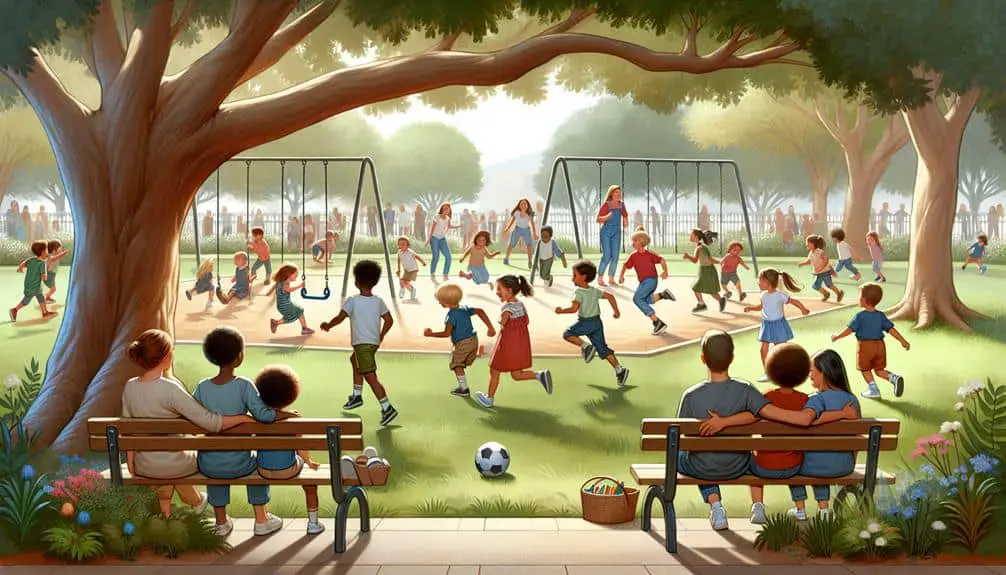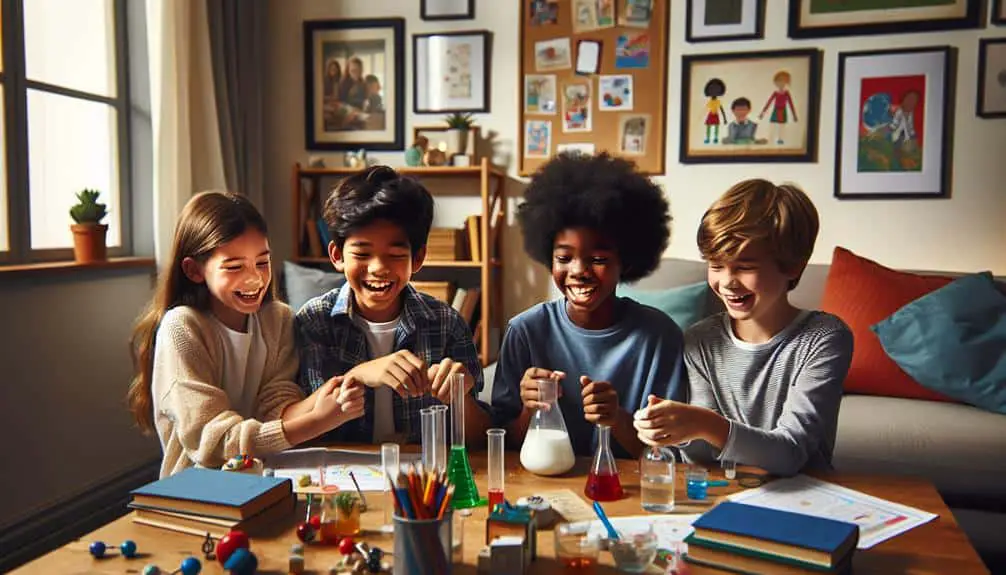Enhancing peer interaction in homeschooling is key. Foster social skills through playdates and activities. Group outings boost teamwork and creativity. Homeschool co-ops provide collaborative learning and support. Digital communities offer connections and resources. Extracurriculars like sports and arts enhance skills and showcase talents. Encouraging peer interaction shapes well-rounded individuals.
Key Points
- Organize group activities like outdoor adventures and craft workshops to promote peer interaction.
- Join homeschool co-ops for collaborative learning and social skill development.
- Utilize online communities for virtual meetups and educational support.
- Encourage extracurricular involvement in sports, art clubs, and skill-building activities.
- Prioritize socialization to enhance social skills and create a well-rounded homeschooling experience.
Importance of Socialization in Homeschooling
Understanding the significance of socialization in homeschooling is paramount for parents seeking to provide a well-rounded education for their children. Peer dynamics and social skills play an essential role in the development of a child's personality and emotional intelligence. While homeschooling offers a unique academic environment, it's essential to actively incorporate opportunities for children to interact with their peers.
Peer dynamics are instrumental in shaping a child's social behavior. Interacting with peers allows children to learn how to navigate different personalities, resolve conflicts, and develop empathy. These experiences are critical for the cultivation of social skills that are essential for success in both personal and professional relationships.
Parents can enhance peer interaction in homeschooling by organizing playdates, enrolling children in extracurricular activities, or joining homeschooling co-ops. These avenues provide opportunities for children to socialize, collaborate, and build friendships outside the family unit. By fostering healthy peer dynamics and promoting social skills, parents can make sure that their homeschooled children develop into well-adjusted individuals capable of thriving in various social settings.
Organizing Group Activities
To promote socialization and enhance peer interaction in homeschooling, consider organizing group activities for your children. Group activities provide opportunities for children to bond, learn cooperation, and develop social skills. Outdoor adventures like nature hikes, camping trips, or sports activities can foster teamwork and create lasting memories. These activities encourage physical exercise and appreciation for the outdoors while promoting friendship among peers.
Craft workshops are another excellent way to engage children in group settings. Crafting allows for creativity, problem-solving, and collaboration. Consider organizing workshops where children can work on projects together, share ideas, and learn from each other. These activities not only enhance social interaction but also boost children's confidence and self-expression.
When arranging group activities, make sure that they cater to different interests and abilities to include all children. Rotate leadership roles among participants to encourage responsibility and teamwork. By incorporating a mix of outdoor adventures and craft workshops, you can create a well-rounded socialization experience for your homeschooled children.
Joining Homeschool Co-ops
Consider expanding your homeschooling network by joining homeschool co-ops, which can provide valuable opportunities for collaborative learning and social interaction among your children. Homeschool co-ops are groups of homeschooling families who come together to support each other in education and social activities. These co-ops offer a sense of community support, allowing you and your children to connect with like-minded individuals who share similar educational philosophies and goals.
One of the key benefits of joining a homeschool co-op is the opportunity for group learning. Your children can participate in classes, workshops, and field trips organized by the co-op, which can enrich their educational experience through shared learning with peers. Additionally, these group activities can help develop important social skills and friendships among children in a supportive environment.
Utilizing Online Communities
Expand your homeschooling network by engaging with online communities, which provide a platform for valuable connections, resources, and support for both you and your children. Online communities offer a diverse range of virtual meetups where you can connect with other homeschooling families, share experiences, and exchange ideas. These virtual meetups can be a great way for your children to interact with peers in a safe online environment, fostering social connections and friendships.
Moreover, online communities often provide a wealth of online support, including forums, chat rooms, and social media groups dedicated to homeschooling. These platforms allow you to seek advice, ask questions, and receive guidance from experienced homeschoolers. Additionally, you can access a wide array of educational resources, curriculum recommendations, and helpful tips to enhance your homeschooling journey.
Encouraging Extracurricular Involvement
Engaging your children in extracurricular activities can enrich their homeschooling experience and enhance their overall development. Community sports offer a great way for your child to stay active, develop teamwork skills, and foster friendships with peers outside of the homeschooling environment. Whether it's joining a local soccer team, participating in a swim club, or playing tennis, these activities not only promote physical well-being but also social interaction.
Art clubs provide a creative outlet for children to explore their artistic talents and express themselves. By joining art clubs, children can learn new techniques, experiment with different mediums, and showcase their work in exhibitions or competitions. This can boost their confidence and help them appreciate the arts in a collaborative setting.
Encouraging extracurricular involvement allows your children to engage with a broader community, develop new skills, and create lasting memories. By participating in community sports and art clubs, they can cultivate a well-rounded homeschooling experience that nurtures both their physical and creative abilities.




